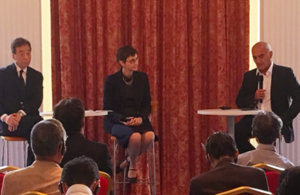Building a world better prepared to fight public health emergencies
UK and Japanese experts stress importance of international partnerships at Global Health Security seminar ahead of G7 health summit

The British Embassy Tokyo held a seminar on Global Health Security and Response to Public Health Emergencies through Better Preparedness on 29 June 2016.
At the G7 Ise-Shima Summit held in May, the importance of building a stronger global health architecture was reinforced to tackle public health emergencies, and concrete action points were agreed. Responses to global health threats such as the Ebola and Zika viruses, AMR, emerging and re-emerging infectious diseases will require better understanding and coordinated action on a global scale as a result of the growing ease of international travel, and the ever increasing following of international sports events. It is very important to recognise that this is not only a problem for developing countries. All nations need to increase their understanding and raise awareness of these issues.
This seminar was held to discuss the importance of global partnerships in responding to health emergencies. Discussion covered the history of infectious diseases, the global health agenda discussion from a previous G7 Summit, an update on global trends, and an introduction to new and sustainable global health preparedness partnership models.
First, Dr Kiyoshi Kurokawa, Chairman of GHIT and HGPI (Health and Global Policy Institute), touched upon the history of the fight against infectious diseases. He then spoke of the health agenda coverage from the G7 Summit in 1979 where Japan played a leading role in bringing attention to this topic to the global arena. He also introduced GHIT as a good example of public-private partnership in fighting infectious diseases. Dr Kurokawa also set out his expectation for Japan to play a further leading role in taking the G7 discussions forward and for the establishment of stronger global partnerships and cooperation in tackling this problem.
The second speaker, Dr Moncef Slaoui, Chairman of GSK Vaccine, set out GSK’s experience in tackling the recent Ebola outbreak, developing of Ebola vaccine and he shared other views from a globally active UK pharmaceutical company. Major Infectious disease threats and outbreaks have emerged in the past to which the world has responded passively. Outbreaks have occurred at regular occurrences and there is still a danger of the world experiencing further large scale outbreaks. It is no longer possible and sustainable for companies to develop vaccines in reaction to threats, and GlaxoSmithKline has proposed the concept of a dedicated, permanent Bio Preparedness Organisation (BPO) which enables continuous design and development of vaccines against pathogens that present threats to global health.
Dr Slaoui also explained about the creation of a global partnership coalition, Coalition Epidemic & Pandemic Innovation (CEPI), which will bring together all stakeholders including funders, product developers, regulators, and global health partners, who collectively address vaccine development challenges to support the operations of the BPO. This will be an independent body to look at prioritising, funding, conducting research and development, advising on regulatory and liability protection issues and stockpiling and distributing vaccines.
After the presentations, the speakers joined a panel discussion and further interactive exchanges of views among the panellists and audience took place. Speakers ended the session by explaining what their expectations were for the upcoming G7 Health Minster’s meeting which takes place in September of this year. It was evident that true global partnership and cooperation are needed to develop sustainable system to fight against and respond to global health threat with the expectation that Japan and UK could play leading roles in taking this step further.